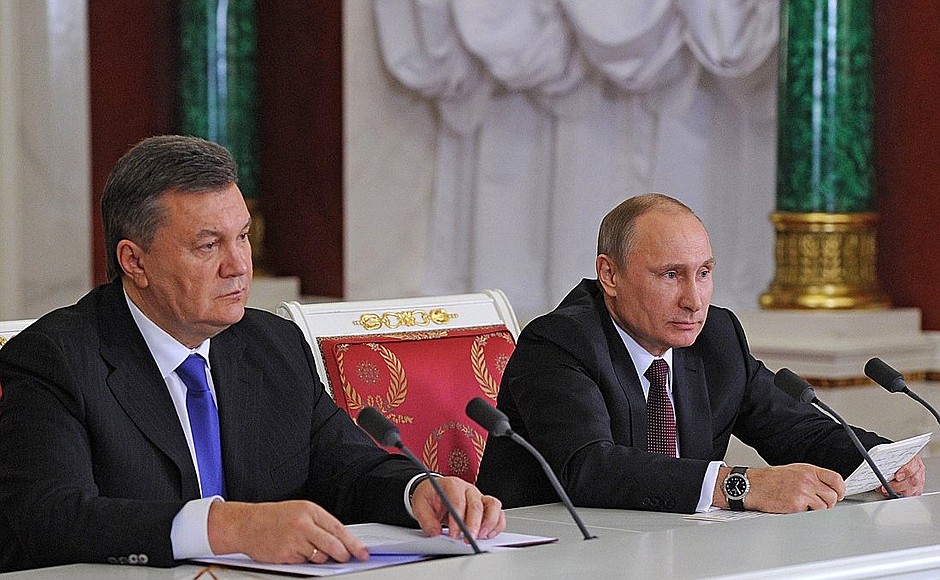
See also
President of Russia Vladimir Putin: Mr Yanukovych, ladies and gentlemen,
The Russian-Ukrainian talks were held in a businesslike and constructive atmosphere. We discussed our bilateral relations and prospects for their development. We spoke about this in detail first separately with Mr Yanukovych, and later at the meeting of the Interstate Commission, which was attended by heads of key ministries and departments.
Russia and Ukraine are strategic partners, united by traditions of friendship and close mutually beneficial cooperation in a wide variety of fields. It is important that both sides expressed their commitment to further expanding contacts in all areas, primarily in the economy, and we have all the necessary objective conditions for that.
We should bear in mind that many companies in our countries are part of what was designed as a single economic complex. Russian and Ukrainian companies support close industrial cooperation and are active in each other’s markets.
Russia remains Ukraine’s biggest trade partner by far: our share in its trade balance is 30 percent. In turn, Ukraine holds sixth place in Russia’s trade balance – I hope it won’t remain in sixth place for long – with 4.6 percent. Among the CIS countries, Ukraine is behind Belarus.
It is clear that we have not been taking full advantage of trade cooperation potential that exits in our countries. There has even been a tendency to reduce commodity flows. We discussed the reasons for this decline and agreed on a number of concrete measures to restore the volume of trade. We approved a plan of action to resolve trade restrictions aimed at simplifying protection and anti-dumping procedures.
I am convinced that its implementation will allow us to increase manifold the export of Ukrainian goods to Russia and other Customs Union countries. The workload of industrial enterprises in Ukraine will also increase significantly, which in turn will lead to job creation.
I would like to note that a significant number of Ukrainian citizens work in Russia; according to official data, their number is almost 1.5 million people, and according to unofficial sources it reaches nearly 5 million. Every year, these Ukrainian citizens working in Russia transfer around $2.3 billion to their families at home, and that is a very significant contribution to the Ukrainian economy.
Russian investments in Ukraine are growing, and their volume has reached $1.5 billion. Thousands of Russian companies, and I want to reiterate – thousands of Russian companies are represented in the metals, processing, chemical and other sectors of the Ukrainian economy.
During the talks particular attention was paid to cooperation in the energy sector, above all in the gas sector, as it traditionally happens. Ukraine continues to buy Russian gas at a discount, which has allowed it to save more than $10 billion over the past years.
We realize that the Ukrainian economy is currently experiencing certain problems today, which are largely a consequence of the global economic crisis. Therefore, as you saw, Gazprom and Naftogaz of Ukraine have signed a contract supplement, which enables Gazprom to sell gas to Ukraine at the price of $268.5 per 1,000 cubic metres.
In reality, the price of gas today is about $400. In any case, we believe that this is a temporary solution and we still need to reach long-term agreements. This applies both to gas supplies to Ukraine and ensuring smooth transit of gas to European consumers.
Russia is ready to continue to meet our partners halfway, but our goal is to develop a truly effective long-term cooperation pattern, to move from discussions about the price to pragmatic interaction with regard to both, as I said, gas supplies to Ukraine and reliable transit of gas.
We have big potential in the aircraft manufacturing sector. We concluded an agreement on renewing joint series production of the An-124 aircraft. The Russian and Ukrainian governments have signed an agreement on supporting this initiative. We will continue to support infrastructure projects.
As you saw, we signed an agreement on building a transport link over the Kerch Strait. As you know, this was originally the Ukrainian President’s initiative. Making it easier for people to travel between our two countries is one of our priorities in general, and work continues on simplifying procedures for crossing the Russian-Ukrainian border. We have signed relevant agreements in this area.
We discussed international affairs. We agreed to coordinate more closely our foreign policy action, especially on matters concerning strategic stability and security in Europe and responding to new global challenges. Drug trafficking is one of these new challenges. The Russian Federal Drugs Control Service and Ukraine’s state drugs control agency have agreed to work very closely together and have just signed the relevant agreement here before you.
We have always paid a lot of attention to cultural cooperation. We signed a programme of events to celebrate the 200th anniversary of the birth of Taras Shevchenko. In 2014 we will also celebrate the 70th anniversary of the liberation of Sevastopol, and in 2015 we will celebrate the anniversary of victory in the Great Patriotic War, and also the 1000th anniversary of the death of Grand Prince Vladimir on July 28.
Colleagues, knowing the difficulties the Ukrainian economy is facing, difficulties that I think are largely due to the global financial and economic crisis, in the aim of supporting Ukraine’s budget, the Russian Government has decided to invest $15 billion in reserves from the Russian National Wealth Fund in Ukrainian government securities.
Let me note that this does not come with any conditions attached and does not involve any increase, decrease or freeze of social welfare commitments, pensions, benefits and wages. And let me reassure you all too: we did not discuss at all today the question of Ukraine joining the Customs Union.